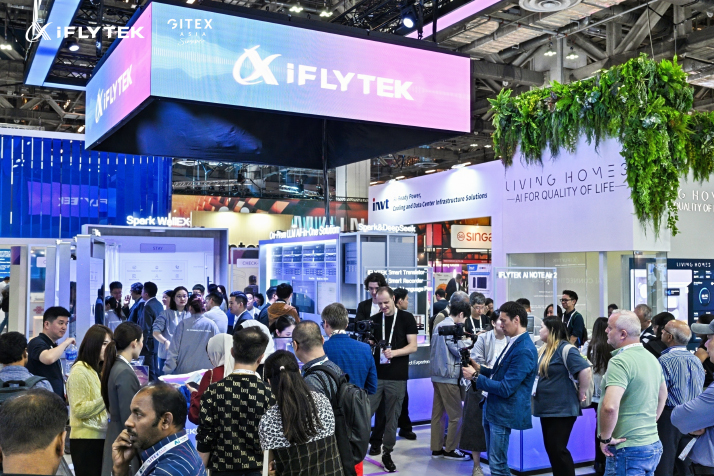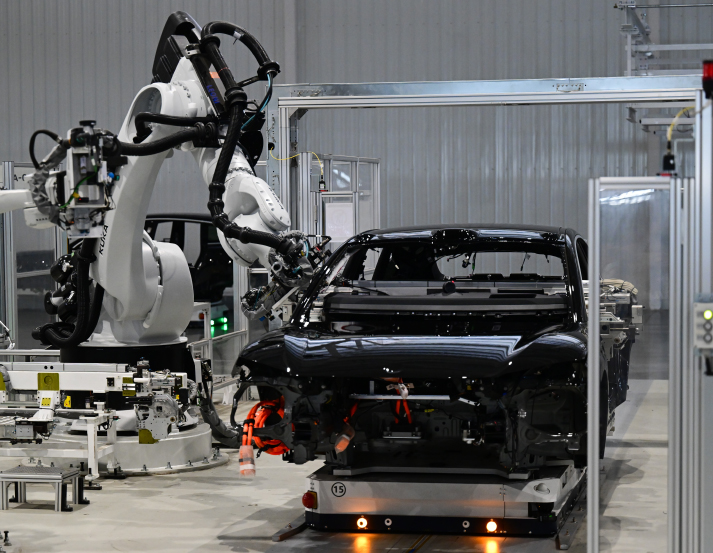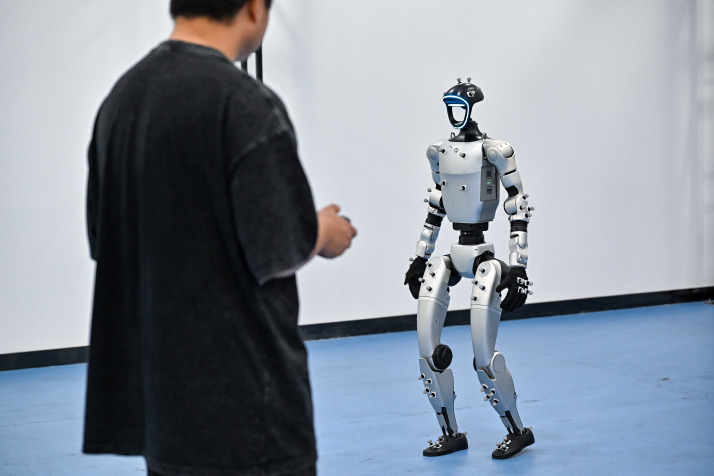
Chinese technology company iFLYTEK Co. Ltd. launched an intelligent speech recognition system designed for humanoid robots this June. While traditional robotic performance suffers in noisy environments, this AI solution achieves 92-percent environmental sensing accuracy—overcoming a key industry challenge. It enhances humanoid computers’ ability to manage complex logistics and warehouse tasks.
Founded in 1999, iFLYTEK, based in Hefei, capital city of Anhui Province in east China, has progressed from developing intelligent speech technology to developing large language AI models. Last year, the company released its large language model SparkDesk V4.0 for text generation, language comprehension and logical reasoning.
“Leveraging AI technology, iFLYTEK powers sectors such as education, healthcare, finance, automotive and urban management,” Dong Bin, Deputy General Manager of the Brand Marketing Center at iFLYTEK, told Beijing Review.
Anhui is riding the new wave of technological revolution and industrial transformation. “Our province has seen a surge in its development of new-energy vehicles, advanced photovoltaics, new types of energy storage, next-generation information technology, and AI,” Anhui Governor Wang Qingxian said at a press conference last May.
According to the provincial government, Anhui is home to over 20,000 hi-tech enterprises today. Hefei is building itself into a digital base, and has gathered over 1,000 AI enterprises, with the total revenue of its AI industry exceeding 100 billion yuan ($13.9 billion) in 2024. The city has over 40,000 professionals working in the AI industry.
AI pioneers
iFLYTEK’s smart translator has been one of its star products. “Today, a growing number of domestic businesses are going overseas. To facilitate multilingual communication, iFLYTEK has kept improving its AI-powered smart translator,” Sun Jingting, Senior Product Manager of the company, told Beijing Review, adding that the device is equipped with domestically developed chips.
According to Sun, the device supports real-time offline translation across 85 languages and dialects. Featuring advanced far-field sound capture, it delivers precise voice recognition even in noisy, multi-speaker environments—dramatically improving speech-to-text accuracy.
iFLYTEK is delivering next-generation AI solutions across multiple industries. As of May, the company’s AI medical assistant had been deployed in over 73,000 grassroots medical institutions across 31 provincial-level regions in China, generating more than 1 billion diagnostic suggestions, while maintaining an accuracy rate of over 96 percent in AI-assisted diagnoses.
The company’s AI technology is transforming education by automating assignment grading and enabling personalized lesson planning. Its SPARK Smart Blackboard boosts classroom efficiency, fosters interactive learning and expands access to educational resources—particularly benefiting students in remote regions.
iFLYTEK has also made strides in automotive intelligence, developing smart cockpits, intelligent audio systems, and autonomous driving solutions. According to Dong, the company partners with over 90 percent of major domestic and joint-ventured automakers in China.
As of late March, the company had deployed intelligent systems for automotive leaders, including China’s Changan Auto and Germany’s Volkswagen. These systems now serve an average of 27 million monthly active users. The company’s smart cockpit solutions, supporting 23 languages, have enabled more than 100 vehicle models to expand into over 60 global markets.
Founded in 2023, HiDream.ai, another AI company now based in Hefei, has been exploring image and video generation with AI. Its AI-generated content technology is applied in e-commerce, video creation and tourism sectors.
Today, HiDream.ai has around 10 million users from 100 countries and regions, the company’s founder Mei Tao told Beijing Review. He noted that the model has democratized AI technology by enabling e-commerce sellers to better showcase products and offering consumers virtual clothing try-on capabilities.

Fast and sound
Headquartered in Hefei, Chinese electric vehicle (EV) maker NIO is riding the new tech tide to upgrade its manufacturing process. Established in 2014, the company now operates three brands—NIO, ONVO and Firefly. In 2024, NIO’s revenue totaled 65.73 billion yuan ($9.1 billion), up 18.2 percent year on year.
As of late April, NIO had filed for or obtained over 9,900 patents. According to the company, it has built a business network covering areas including chips, battery systems, intelligent driving and AI. NIO has built research and development (R&D) and production facilities in over 10 locations across the globe, including Germany, the United Kingdom, Hungary and Singapore, serving users in more than 350 cities worldwide.
In 2020, NIO set up its China headquarters in Hefei. In recent years, Anhui has prioritized the development of the automotive industry, and especially EV manufacturing. Hefei, a powerhouse in China’s auto industry, boasts strong capabilities in battery R&D and intelligent technology, as well as a complete auto supply chain. The municipal government has also rolled out supportive policies, including fast-tracked administrative approvals and talent incentives, to boost the local EV industry.
The company currently runs two manufacturing facilities in Hefei, including its Second Advanced Manufacturing Base—a fully automated “lights-out” factory requiring minimal human intervention.
This smart factory features end-to-end automation across stamping, automobile body assembly and painting processes. The body workshop alone boasts 941 robots, enabling flexible multi-model production. AI-driven systems manage approximately 80 percent of manufacturing decisions, ensuring precision and efficiency.
By leveraging its intelligent manufacturing system, the factory has lowered its costs by 10 percent and improved production efficiency by 10 percent. The AI system can complete a comprehensive vehicle inspection in just three minutes. This automated process is 10 times faster than manual inspection while achieving a 99.7-percent defect detection accuracy.
The intelligent system is also applied in a six-tiered warehouse for flexible storage management, as well as an automated assembling line that allows the simultaneous manufacturing of different vehicle types. With the automated system, the four doors of a car can be installed with a deviation of no more than 0.5 millimeters.
NIO is expanding its charging services and chip R&D. As of late June, the company had built 3,376 swap stations and over 20,000 charging poles nationwide. Its self-developed smart driving chip features ultra-low latency, low energy consumption and strong image-analysis abilities, which will enable a higher level of autonomous driving in the future.
According to the company, it is transforming its industrial park into a smart auto hub, attracting 143 local suppliers as of today. Its major partners have set up shops nearby, enabling just-in-time production that reduces inventory and logistics costs.

Smart manufacturers
Behind the flawless paint gracing Maserati’s iconic curves lies the precision of China’s EFORT Intelligent Robot Co. Ltd. The company’s advanced robotic arms achieve unparalleled trajectory control, delivering every spray with perfection.
Founded in 2007 and based in Wuhu City, Anhui, EFORT focuses on manufacturing robots applied in the electronics, automobile and shipbuilding industries.
“EFORT has independently created core components, shifting from producing industrial robots to making embodied intelligent robots,” Zhang Wei, Deputy Chairman of the company, said.
Zhang explained that their robots are engineered to take over hazardous or physically demanding tasks from human workers.
This year, the company unveiled its humanoid robot Yobot, standing 1.75 meters tall. Powered by China’s DeepSeek AI model, Yobot is designed to assist with material handling in automotive workshops.
The company has seen accelerating growth in recent years since it was listed on China’s Nasdaq-style Science and Technology Innovation Board, known as the STAR market. EFORT’s industrial robot sales in 2020 totaled no more than 2,000. In 2024, its robot sales grew by over 30 percent year on year to reach over 16,000.
COWAROBOT, an autonomous driving and intelligent robot company in Wuhu, has introduced a range of autonomous vehicles designed for urban sanitation, logistics and transportation. Established in 2015 in Wuhu, it has launched over 10,000 autonomous vehicles in more than 50 domestic cities to date.
“Urban sanitation is challenged by traffic incidents, an aging workforce and labor shortages, for which we have developed intelligent vehicles to facilitate the work,” Lu Wenjun, Deputy General Manager of the company, said.
COWAROBOT has also introduced L4 autonomous minibuses for short-distance travel, offering regular services in multiple routes in cities like Shanghai, Lu said.
An L4 autonomous bus refers to a self-driving bus classified as Level 4 (high automation) under the Society of Automotive Engineers International’s level of driving automation.
Wuhu now has over 300 up- and downstream companies active in robot and component manufacturing and intelligent system design. The city’s robotics industry output exceeded 40 billion yuan ($5.58 billion) in 2024. –The Daily Mail-Beijing Review news exchange item





